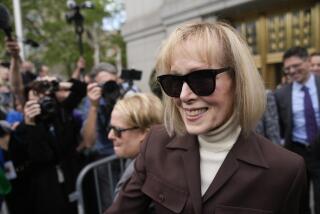Ex-Mustang Manager Says Rizzitello Threatened Him
- Share via
SANTA ANA — The former manager at the Mustang Club testified Monday that reputed mobster Michael Anthony Rizzitello used threats to muscle in on profits at the topless bar after its chief financier, William Carroll, was shot in an attempt on his life.
“Mr. Rizzitello said, ‘Bill Carroll wanted to dine alone,’ ” Gene Lesher, a key prosecution witness, testified at Rizzitello’s trial on attempted murder charges in the Carroll shooting. Prosecutors contend that comment meant that Carroll was shot because he would not cooperate with Rizzitello.
Carroll has identified Rizzitello as the gunman who shot him three times in the back of the head in an empty Costa Mesa parking garage around midnight on April 30, 1987, leaving him permanently blind. Joseph Angelo Grosso, 46, already convicted in the Carroll shooting, was identified as the man who held him down.
Carroll, 56, has testified that Rizzitello told him before he started shooting: “This is for not letting us eat.”
Lesher told jurors that two weeks after the Carroll shooting, Rizzitello demanded a meeting with him at the Balboa Bay Club. Lesher said Rizzitello quizzed him about the club’s profits and then inferred that he could end up like Carroll if he didn’t agree to pay Rizzitello up to $5,000 a week. The payments, Lesher said, were to be made through George Yudzevich, a bouncer at the club who was later murdered.
A short time later, Lesher said, Rizzitello demanded another meeting after learning that Lesher had kept his ties to Carroll through associates.
“He (Rizzitello) stated that I had to declare myself,” Lesher said, meaning he was either with Rizzitello or against him.
On cross-examination late Monday, defense attorney Anthony P. Brooklier began his attempt to portray Lesher as one of the conspirators who controlled the Mustang after the Carroll shooting and is now trying to make Rizzitello the fall guy for the shooting.
Brooklier contends that it was Yudzevich who shot Carroll, and that afterwards it was Lesher and Yudzevich, along with Grosso, who profited from Carroll’s forced absence from the club.
Brooklier also contends that Carroll was responsible for the murder of the club’s first manager, Jimmy Casino, in January, 1987. Yudzevich then shot Carroll, according to Brooklier’s scenario, and Carroll had Yudzevich murdered in retaliation.
Brooklier began his cross-examination with an immediate attack on Lesher. The defense attorney asked Lesher if he was forced out of his job as a vice president at Liberty National Bank because of suspicion in the district attorney’s office that he and Carroll had “ripped off” the bank.
Lesher eventually admitted that even though he had been cleared of any wrongdoing, he resigned because he didn’t want “a cloud” over him at the bank.
At Grosso’s trial three months ago, jurors considered Lesher’s testimony highly significant in corroborating the prosecution theory that the motive behind the Carroll shooting was Rizzitello’s attempt to control Mustang profits.
Brooklier unveiled another key element of his defense Monday, claiming that prosecutors made a deal with Carroll in a bank-fraud case in exchange for him naming Rizzitello as the man who shot him.
Prosecutors have called Brooklier’s allegations “ridiculous.” But Brooklier introduced a district attorney’s report to show that Carroll met with investigators at 1:15 p.m. on Oct. 6, 1988, to disclose for the first time who had shot him. At 1:30 p.m. that same day, Carroll received a misdemeanor sentence of no jail time and no fine in the fraud case.
Deputy Dist. Atty. Wallace J. Wade, who was at both the Carroll sentencing and the Carroll meeting with investigators, said the 1:15 p.m. time on the report must be an error.
“The meeting with Carroll did not take place until later; I know because we were all wondering once his case was over, would he finally talk about who shot him,” Wade said.
More to Read
Sign up for Essential California
The most important California stories and recommendations in your inbox every morning.
You may occasionally receive promotional content from the Los Angeles Times.













